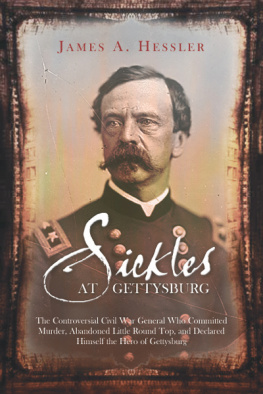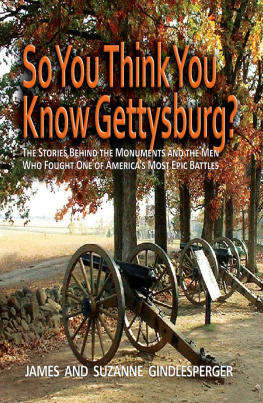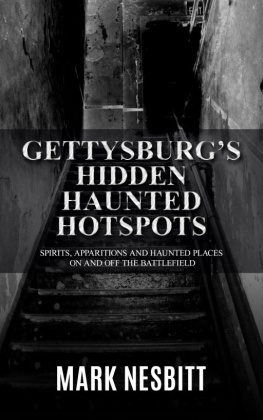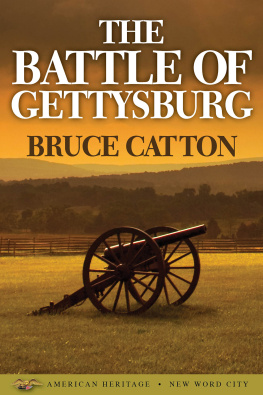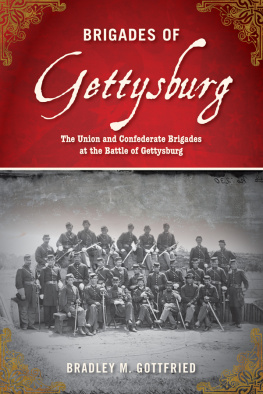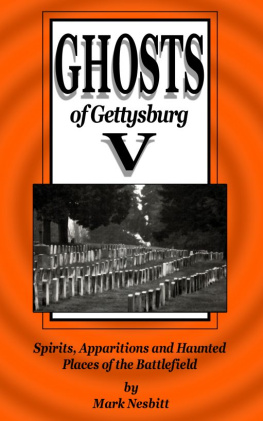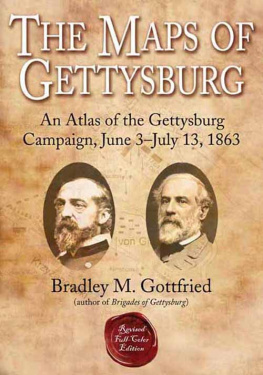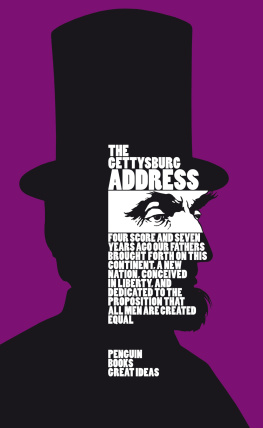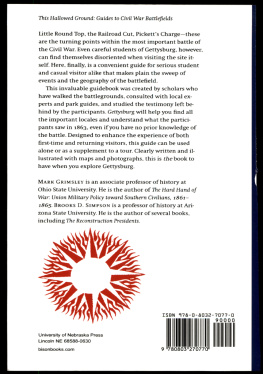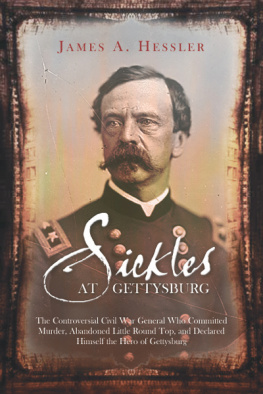

2009, 2010 by James A. Hessler
All rights reserved. No part of this publication may be reproduced, stored in a retrieval system, or transmitted, in any form or by any means, electronic, mechanical, photocopying, recording, or otherwise, without the prior written permission of the publisher. Printed in the United States of America.
Cataloging-in-Publication Data is available from the Library of Congress.
ISBN 978-1-932714-84-5
eISBN 9781611210453
05 04 03 02 01 5 4 3 2 1
First paperback edition, first printing

Published by
Savas Beatie LLC
521 Fifth Avenue, Suite 1700
New York, NY 10175
Phone: 610-853-9131
Editorial Offices:
Savas Beatie LLC
P.O. Box 4527
El Dorado Hills, CA 95762
Phone: 916-941-6896
(E-mail) editorial@savasbeatie.com
Savas Beatie titles are available at special discounts for bulk purchases in the United States by corporations, institutions, and other organizations. For more details, please contact Special Sales, P.O. Box 4527, El Dorado Hills, CA 95762, or you may e-mail us at sales@savasbeatie.com, or visit our website at www.savasbeatie.com for additional information.
For Michele, Alex, and Aimee
and in memory of my parents, Donald and Kathleen Hessler
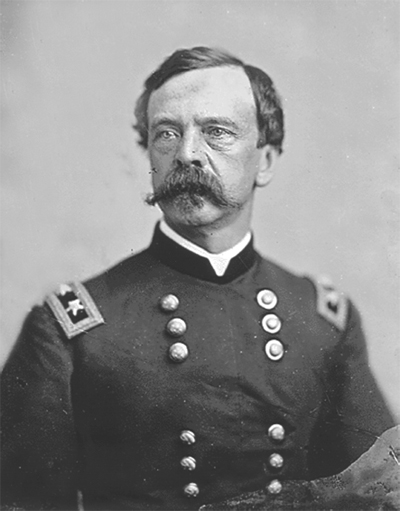
Major General Daniel Edgar Sickles
National Archives
Photos and Illustrations
Photos and illustrations have been distributed throughout the book for the convenience of the reader.
Cartography
Preface
It seems to be a clich for authors to begin Gettysburg books by apologizing for writing yet another. Fortunately, this is not a recent development. As early as 1902, Lieutenant Colonel William A. Fox wrote in the New York Monuments Commissions battle report: Another history of Gettysburg may seem superfluous and presumptuous. Foxs history of the battle was written under the auspices of Gettysburgs most influential participant: Daniel Edgar Sickles.
Major General Sickles is known to students of the battle for his controversial and unauthorized advance to the Peach Orchard on July 2, 1863, seemingly in defiance of Major General George Meades orders. Sickles participation in the battle lasted barely twenty-four hours, yet no single action dictated the flow of the second days combat (and much of the third day) more than his controversial advance. Common historical place names such as Devils Den, the Wheatfield, and the Peach Orchard might not exist today were it not for Sickles. One of Gettysburgs most mythical moments, the last-minute defense of Little Round Top, would almost certainly have occurred quite differently were it not for Sickles. Whether the battles outcome would have been any different we will never know, but the history that occurred surely would have been significantly altered. As a result of his actions, no participant with the possible exception of James Longstreet has generated more controversy and hostility in Gettysburgs history.
Sickles importance to Gettysburg transcends his one day of battle. He is reviled by many Gettysburg students for his post-battle participation in attempts to remove George Meade from command of the Army of the Potomac. The feud between Sickles, Meade, and their partisans are as much a part of Gettysburgs history as the battle itself, and they added a considerable quantity of primary material (often inaccurate and self-serving) to the Gettysburg historical record. Sickles would return to Gettysburg many times during his remaining fifty years of life. These visits provided him numerous opportunities to give speeches and talk to news reporters, ensuring that his version of Gettysburgs history would be perpetuated. On a positive note, he was a driving force in placing monuments on the field and in establishing Gettysburg National Military Park, even though he is more often remembered today for the financial misappropriations that led to his expulsion from New Yorks monument commission.
When one combines his battlefield performance with his post-battle efforts, it is obvious that he stands as one of Gettysburgs most monumental figures. Yet, typical battlefield visitors know virtually nothing about him, and what knowledge they do have is almost universally negative. There are only a handful of Sickles biographies in print, all of which are either dated or (sometimes) poorly researched. Only historian Richard Sauers has produced any significant full-length treatments of Sickles within the context of Gettysburg.
This book is not a traditional Sickles biography. His contribution to Gettysburg is its primary focus. Until now, no full-length work has attempted to provide a comprehensive view of Sickles and Gettysburg: what led him there, his actions on the field, the post-battle controversies, and his role in developing the National Military Park. The second days battle between Sickles Third Corps and James Longstreets Confederate First Corps necessarily slides into the spotlight, as does one of the battlefields most underrated and influential areas: the Peach Orchard. Sickles abandoned Cemetery Ridge because he preferred the terrain surrounding Joseph Sherfys peach orchard. Why?
As Lieutenant Colonel Fox predicted more than a century ago, some prospective readers may well believe another Gettysburg book is superfluous and presumptuous. For a small body of readers, this may be true. But a greater majority of well-meaning Gettysburg students have been trained by the novel The Killer Angels and motion picture Gettysburg to believe that July 2, 1863, is really the story of Joshua Chamberlain and Little Round Top. Dan Sickles has been relegated to the role of a stereotypical political general conspiring against George Meade to blunder away the battle for the Union cause. Sickles was considerably more three-dimensional than many recent Gettysburg works have influenced readers to believe. From the Federal perspective, for better or worse, Gettysburgs second day was Sickles battle. Readers dont have to like Dan Sickles, but as with any historical figure, an open-minded appreciation of his full character and actions, both positive and negative, will help them better understand the events that occurred around him.
A final reason for this book is that Dan Sickles remains one of the wars most fascinating characters. He had many influential friends as well as enemies. He rose from Tammany Hall politics in New York City, to defendant in a sensational murder trial, to playing a pivotal role on the wars greatest battlefield. He followed up those accomplishments with another five decades in the public eye as a controversial war hero and politician.
As long as Gettysburg produces such entertaining individuals, there should be no apology for writing and reading about them.
Acknowledgments
Although many Gettysburg historians personally despise Dan Sickles, I was still fortunate enough to receive much support and assistance during the completion of this project. The staffs of several institutions generously provided their time, access, and permission (where necessary) to use their materials: John Heiser at Gettysburg National Military Park, Tim Smith at Adams County Historical Society, Dr. Richard Sommers at United States Army Military History Institute (Carlisle Barracks, PA), John-Michael Muller at Yale University (Beinecke Rare Books and Manuscripts Library), Tammy Kiter at New York Historical Society, RA Friedman and the staff at Historical Society of Pennsylvania, Thomas Lannon and Laura Ruttum at New York Public Library (Manuscripts and Archives Division), Jane Cuccurullo from The Green-Wood Cemetery, Michael Rhode, Brian F. Spatola, and Kathleen Stocker at the National Museum of Health and Medicine, Armed Forces Institute of Pathology, Michael R. Ridderbusch at West Virginia University Libraries, and Laura Clark Brown at Wilson Library, The University of North Carolina at Chapel Hill.

